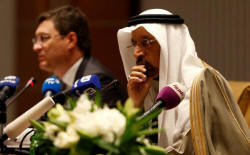Saudi Arabia reassures Canada on oil supplies in row
over jailed activists
 Send a link to a friend
Send a link to a friend
 [August 09, 2018]
By Aziz El Yaakoubi [August 09, 2018]
By Aziz El Yaakoubi
RIYADH (Reuters) - A row over human rights
in Saudi Arabia will not have any impact on Saudi oil supplies to
Canada, its energy minister said on Thursday, reassuring customers after
Riyadh froze new trade with Canada and ruled out mediation efforts.
Saudi Arabia, infuriated by Canada's demand last week that jailed
activists in the kingdom be released immediately, expelled the Canadian
ambassador on Sunday, blocked imports of Canadian grain and ended
state-backed educational and medical programs in Canada.
The dispute has threatened to undermine Riyadh's foreign investment
drive, a campaign already unsettled by a series of assertive political
and diplomatic initiatives by the top oil exporter.
Saudi Arabia has a "firm and long-standing policy" that petroleum
supplies are not influenced by political considerations, Khalid al-Falih
said in a statement.
"The current diplomatic crisis between Saudi Arabia and Canada will not,
in any way, impact Saudi Aramco's relations with its customers in
Canada."

The Financial Times reported on Wednesday that the Saudi central bank
and state pension funds had instructed their overseas asset managers to
sell their Canadian equities, bonds and cash holdings.
The Saudi government's Center for International Communication (CIC)
posted a tweet late on Wednesday saying "neither the government nor the
Central Bank or the state pension fund has issued any instructions
regarding the sale of Canadian assets".
But it promptly deleted the post without providing an explanation. CIC
did not respond to a request for comment.
Foreign Minister Adel al-Jubeir on Wednesday ruled out any mediation
efforts and called on Ottawa to "fix its big mistake," saying the
kingdom was considering implementing more measures against Canada for
interfering in Saudi Arabia's domestic affairs, without elaborating.
Canadian Prime Minister Justin Trudeau later appeared to extend an olive
branch, saying he would keep pressing Saudi Arabia on civil liberties
but also saying the Gulf Arab state had made some progress on human
rights.
"Diplomatic talks continue ... we don't want to have poor relations with
Saudi Arabia. It is a country that has great significance in the world,
that is making progress in the area of human rights," Trudeau said.
Saudi Arabia has in recent months detained several women's rights
activists, some of whom had previously campaigned for the right to drive
and an end to the kingdom's male guardianship system, the latest to be
swept up in a government crackdown on activists, clerics and
journalists.

[to top of second column] |

: Saudi Energy Minister Khalid al-Falih and Russian Energy Minister
Alexander Novak attend a news conference at the Ritz-Carlton hotel
in Riyadh, Saudi Arabia February 14, 2018. REUTERS/Faisal Al
Nasser/File Photo

"IMPULSIVE POLICY-MAKING"
Since rising to power in 2015, Crown Prince Mohammed bin Salman has courted
Western allies to support his reform plans to modernize and open up the kingdom,
offering billions of dollars in arms sales and promising to fight radicalism in
the kingdom.
The 32-year-old de facto ruler has launched a campaign of social and economic
change, but has not eased the absolute monarchy's total ban on political
activism. He has taken a more aggressive stance toward arch-rival Iran, began a
three-year war in Yemen and led a boycott of fellow Gulf Arab state Qatar.
The latest dispute with Canada is a sign that the prince is willing to risk
riling international investors in order to remain in control of the process of
change, RBC Capital Markets' Helima Croft wrote in a research note.
"Western governments expressing concerns about human rights issues in the
kingdom is nothing new and Saudi authorities have long pushed back against what
they characterize as inappropriate interference in their internal affairs," she
said.
But Prince Mohammed is more willing than predecessors to throw caution to the
wind, she added, and may be extra sensitive to outside criticism in light of
recent challenges implementing his ambitious economic reform agenda.

The row with Canada strengthens an impression of impulsive policy-making. "We
have seen this before. They overreact and then cannot find a way to back down
without losing face," a diplomat in the Gulf region said.
In addition to the trade freeze, Riyadh has stopped sending patients to Canadian
hospitals and suspended educational exchanges, moving Saudi scholars to other
countries.
Bilateral trade between Canada and Saudi Arabia is worth more than $3 billion a
year. Canadian exports to Saudi Arabia were about $1.12 billion in 2017, or 0.2
percent of the total value of Canadian exports.
(Additional reporting by Hesham Hajali in Cairo and Katie Paul in Dubai; Editing
by Richard Balmforth)
[© 2018 Thomson Reuters. All rights
reserved.] Copyright 2018 Reuters. All rights reserved. This material may not be published,
broadcast, rewritten or redistributed.
Thompson Reuters is solely responsible for this content. |